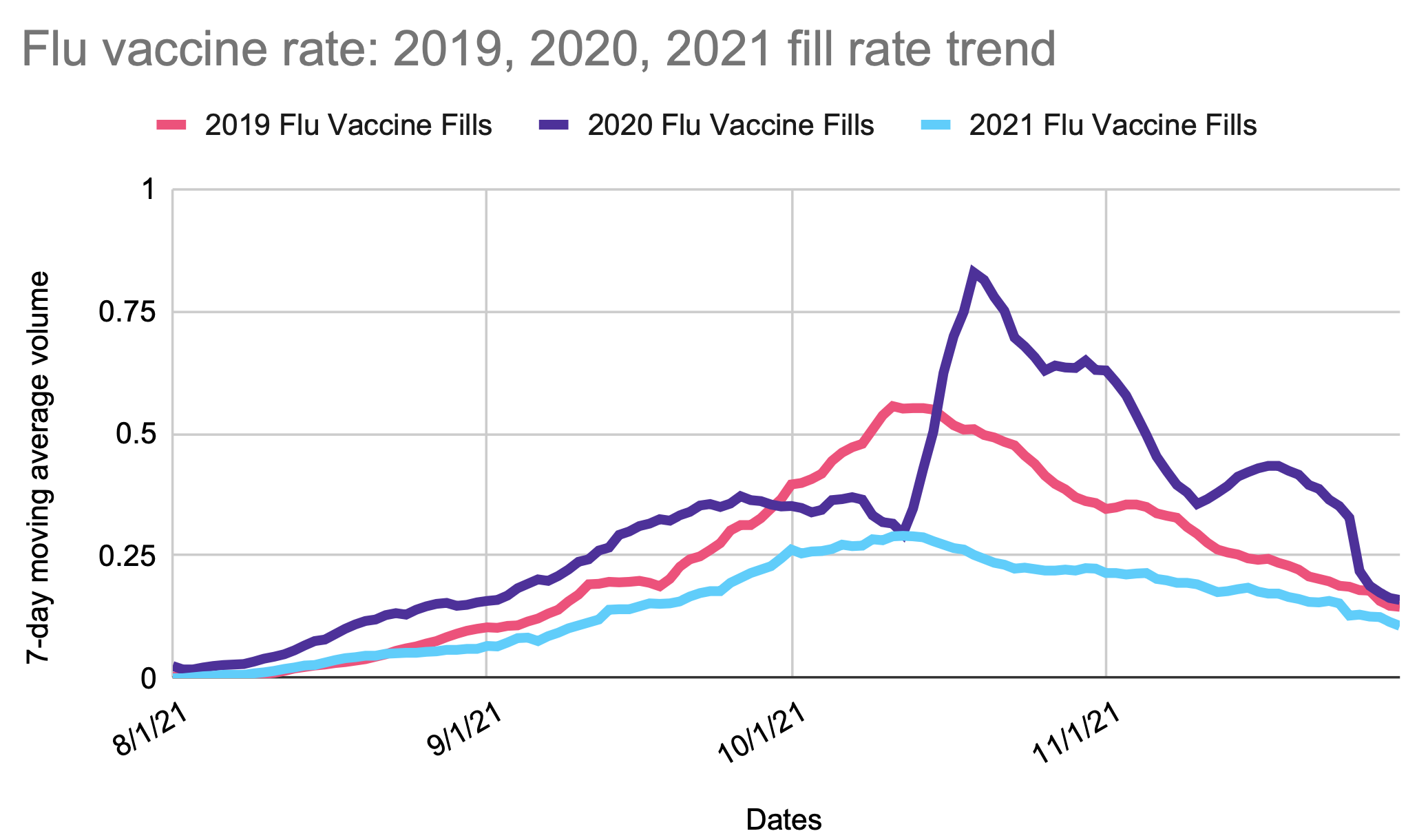Last year, the United States saw an unusually quiet flu season, as a record number of Americans armed themselves with the flu vaccine. In fact, according to SingleCare data, flu shots were up 20% during the month of October in 2020 compared to the same time period the year prior, which may have been attributed to the looming threat of a “twindemic”. Today, with 194 million Americans fully vaccinated against COVID-19, masking and distancing protocols have relaxed. Despite the Centers for Disease Control (CDC) issuing a warning about the risk of a potentially severe flu season this year, SingleCare data reflects a significant decrease in flu vaccinations this fall and a SingleCare survey reveals fewer people are planning on getting the shot.
Flu season 2021 vs. 2020: Flu vaccination rate down 53%
October is typically the busiest month for flu vaccinations at SingleCare. The CDC recommends that everyone over the age of 6 months receive their annual flu shot by the end of October. In analyzing its data from August to November 2021 with the same time period last year, SingleCare saw that flu vaccinations dropped by 53%. These are remarkably low numbers even by pre-pandemic standards: When comparing August to November 2021’s data to the same time period in 2019, SingleCare found that there was a 38% reduction in flu vaccinations.

“Vaccinations were incredibly high last year, and combined with the effect of people wearing masks and distancing themselves, it led to a much lower level of flu activity,” said Ramzi Yacoub, Pharm.D., chief pharmacy officer at SingleCare. “Whether it’s because people are feeling protected with their COVID vaccine, experiencing vaccine fatigue, or don’t realize they can and should also get their flu shot, the low vaccination rates are concerning. People need to be aware that it remains important to receive annual immunizations from the flu.”
According to the CDC, fewer U.S. adults have received a flu vaccine at either the pharmacy or physician medical clinics this year compared to the previous year. A recent SingleCare survey found that 45% of U.S. respondents said they do not plan to receive a flu vaccine this year, which is down 3% compared to last year. The survey also revealed that more than a third of respondents believe that the flu vaccine is not effective.
The bottom line is it is still recommended that people get both the COVID-19 and flu vaccine to best protect themselves against these viruses. As of today, people can receive both the COVID vaccine (including COVID booster shots) and the flu vaccine during the same visit at their pharmacy. “It is incredibly important to get both the flu vaccine and COVID-19 vaccine to protect yourself from both viruses, even if the potential to contract the virus is low,” said Dr. Yacoub. “These vaccines will protect you against most flu strains and severe cases of COVID. If you do manage to catch the flu or COVID, the symptoms will be less severe and the illness shorter.”
In addition to getting vaccinated, Dr. Yacoub recommends that the best way for people to stay healthy during flu season is to:
Regularly wash your hands
Wear a mask when around others
Cover your cough or sneeze
Avoid touching your face, especially eyes, nose and mouth
Always stay home if you are feeling sick
Data Methodology: Data analyzed include flu vaccines filled by SingleCare consumers in August, September, October and November 2019, 2020, and 2021. Data was reviewed and analyzed by the SingleCare team as of Dec. 8, 2021.
Survey Methodology: SingleCare conducted a 2021 flu vaccine survey online through AYTM on Sep. 30, 2021. The 2020 flu vaccine survey was conducted online through AYTM on Aug. 28, 2020. Although the 2021 and 2020 flu shot surveys were separate samples, both included 1,000+ U.S. adults aged 18+ years old and both were census-balanced to match the U.S. population in age, gender, and U.S. region.
